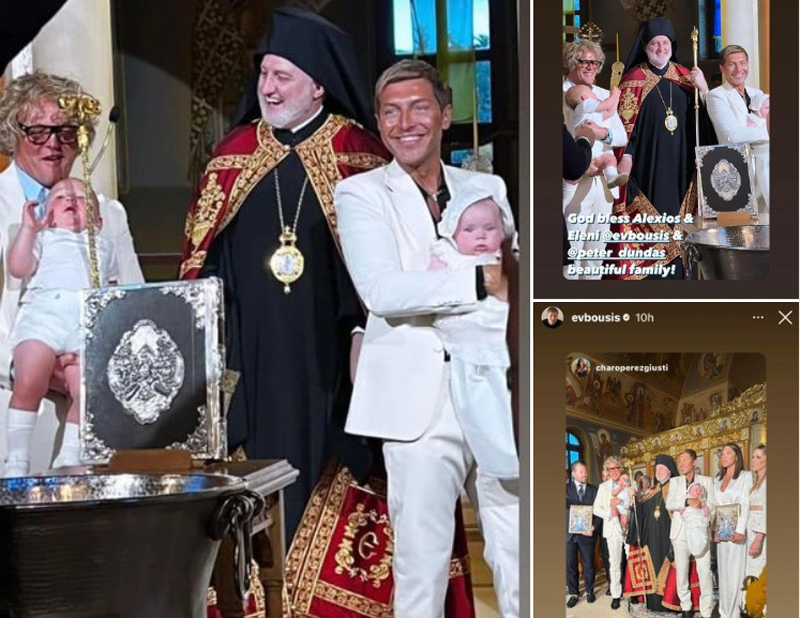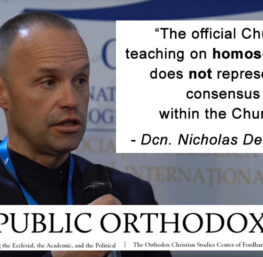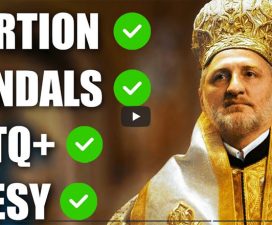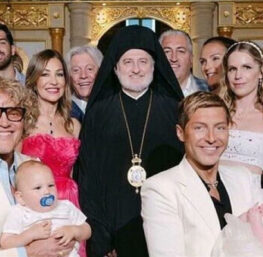 by Fr. Antoine Melki –
by Fr. Antoine Melki –
There were many reactions in the news and on social media to the Baptism celebrated by Abp. Elpidophoros, the head of the Greek Orthodox Archdiocese of America, of two children from a surrogate mother, whose paternity is claimed by two men who declare an association in a same-sex marriage. Some of these reactions are serious while some others are emotive, for or against the act. The discussion of the legality of what happened is not the concern of this article, although the form required for the Baptism in the Orthodox Church was not respected.
Regardless of the political and social effects of this Baptism or the scandal that it provoked among believers, the aim here is to respond to the emotional reactions and questions that some people raise, whether out of ignorance or bad intention, such as whether any priest has the right to refuse the Baptism of any child; what about the children of fornication; and other questions. In addition, some called for the Church to take a “progressive” position and look for some correct way to carry out such a Baptism, since same-sex marriages are taking place anyway.
First of all, it should be noted that the Baptism of children has been a given in the Church since the days of the Apostles. In the Acts of the Apostles, the phrase “he/she and his/her household were baptized” occurs several times. Among the arguments often cited in response to the refusal of some Protestants to baptize children is what St. Irenaeus said in his Against Heresies that “Christ has come to save all, infants and children, young men and old, all of whom are born again by Him and become in truth children of God.”
The first response to those who are sincere in their reactions, especially those who include Baptism among the rights of the child, is that Baptism is a process that moves a person from outside to inside the Church. It’s not an act of magic, nor is it a purely administrative measure. Rather, it’s a process that has pre- and postconditions that need to take place for it to be complete.
Originally, infant Baptism was based on the theology of the Trinity and the Church’s teaching on the family. From Genesis, the Church sees that through marriage, a man and a woman become one body. As the family is an icon of the Trinity, children are born from the one body of the parents. For this reason, all ecclesiastical laws permitting the Baptism of a child of fornication or rape, come as an “economia” connected to the person requesting the Baptism of this child and the accompanying hope that this child may be brought up in the faith. The Synaxarion mentions that St. Theodore of Sykeon, Bishop of Anastasiopolis, was born to a woman named Maria who had fornicated with one of Caesar’s messengers. But her subsequent repentance put her son on the path of holiness, which he attained, according to the testimony of the entire Church.
The Church doesn’t recognize the Baptism of children without the parents or their representative. The acceptance of persons into the Church is primarily the work of the community, not of individuals. Hence, it’s not permissible to subject the Baptism of children brought to the Church to emotive factors that aren’t based on the Bible and Tradition, lest it be a material exploited by advocates of deviance and perversion.
It’s also not permissible to deal with the rejection of these new cases as a rejection of progress and modernity, especially when talking about the Bible. Gender activists and supporters, including Orthodox “theologians”, frequently talk about progressivism in the Bible. The truth is that the Bible can’t be described as narrow-minded or progressive. We either accept The Bible or reject it. This isn’t based on interpretations according to demand and desire.
In the Orthodox Church, the Fathers of the Church interpreted the Gospel and left it to us as a legacy that shows us the path for our lives here on Earth. Some would say that this position freezes the Bible and prohibits its interpretation now and in the future, but this isn’t true, for the Bible is the believer’s reference for every life question facing him. He interprets it within the logic, experience, and method of Holy Tradition, with emphasis on experience, in a spirit of prayer and humility, not using intellectual techniques, methodologies, and conjunctions.
Hence, the questions that should be addressed on the issue of the “children” of homosexuals aren’t focused on the children but rather the adults surrounding them. Surrogacy arose as a medical necessity and the Church didn’t fully accept it. Wouldn’t it be adultery in the case of homosexuals benefiting from it where there is no medical justification? Doesn’t the fact that some women are taking “surrogate motherhood” as a profession, under supply and demand, contradict the necessity of repentance for the sin of transgressing nature? Does the existence of a civil contract make the association of two people of the same sex a marriage in the Church, while the Church requires the Sacrament of holy matrimony for a man and a woman who are bound by a civil marriage in order to baptize their children? And most importantly, while the Bible clearly condemns any relationship contrary to nature?
How can a child be baptized when he’s among a group of “violators of the law,” while psychology and educational sciences warn of huge problems caused to this child by such an environment? If “acquiring” children by homosexuals or by those who reject wedlock isn’t accepted, doesn’t baptizing these children legalize these rejected behaviors? Here, the use of the term “acquisition” is more accurate than the use of the term “adoption,” which is now used even to describe the purchasing of pets.
Does the Church have accurate answers to these questions? Yes, it does. It’s its ethos. The legalistic, the scholastic, and the secular are unable to perceive this ethos. On the other hand, the believer’s position is to adhere to what the Church received from the Apostles and Fathers and passed on through generations.
With no intention to judge anybody, there’s no place for emotions in these issues. Today’s societies spend billions on weapons and destruction without mercy, but they succumb when homosexuals and perverts claim they’re oppressed, only to enforce another oppression on those who refuse to submit to the whims of the homosexuals. According to human reason, this is clear hypocrisy, which the Church calls “deception” in its teaching.
Deception is the work of satan, and it’s confronted with discernment. Discernment comes from an enlightened mind in harmony with a heart filled by the light of Christ.
—————————————————
HT: Orthodox Christianity. (Minor organizational edits and bolding of key phrases done by blog editors done to enhance readability.)





“Surrogacy arose as a medical necessity and the Church didn’t fully accept it.” I cannot agree that surrogacy is a medical necessity. Surrogacy arises from the viewpoint that children are property. The Church correctly objects to surrogacy for many sound reasons. Surrogacy takes childbearing outside of the God-created intimate bond of husband and wife. How can it be moral to deliberately create a child who will never know his own mother?
Surrogacy is dehumanizing. It creates children as a means to the end of creating families. It is immoral to regard a human being as a means to an end; he is always an end in himself. Surrogacy is a form of human trafficking, both of the gestating mothers and of the children. Poor women offer up their bodies and their own children to wealthy people who can pay for the children. The children are essentially chattel, sometimes even glorified fashion accessories.
Hollywood is rife with wealthy women who use surrogacy to preserve the sales appeal of their own bodies. They cannot risk stretch marks and drooping breasts when their income relies on their youthful beauty. Many people do not understand that many assisted reproductive technologies involve destroying human embryos. Several embryos are implanted into a woman’s uterus, hoping that one or two will survive. If more than three embryos grow after implantation, the pregnant woman is encouraged to “selectively reduce”, that is, abort, some of the developing babies.
To my disgust, my home of state of Washington was the first in the nation for legislation permitting surrogacy for profit. That was largely to fulfill the desires of sexual minorities who have no reproductive impairments; rather, they have an aversion to using their reproductive organs as God intended. Surrogacy is a many-faceted evil. It is purely the hubris that “I want” overrides God’s plan for creating children.
Yours in Christ as an OCA member.
And here comes Dn Nicholas Denysenko, former director of pro-LGBT Huffington Ecumenical Institute at Loyola Marymount University (LMU) in California (funded by the openly-bisexual and maker of movies promoting homosexuality to teens Michael Huffington), defending the heretical baptism ceremony of “married” homosexuals that Elpidophoros performed in Greece.
Denysenko is a long time friend of infamous pro-homosexual activist Inga Leonova. Denysenko also supports other former gay Orthodox who abandoned the Church and encourages many homosexual propagandists who are fighting to normalize homosexuality and gay marriage within the Orthodox Church.
TO BAPTIZE OR NOT: GOD’S LOVE AND IMAGE
by Rev. Dr. Nicholas Denysenko
https://publicorthodoxy.org/2022/07/26/to-baptize-or-not/
Are we beginning to see a pattern here folks? Or is it just me?
As a conservative Bible believing Lutheran I am shocked that a Greek bishop would baptize children of a homosexual union this makes it seem the Greek Orthodox Church is saying that. Gay unions and marriages are some sort of normalcy and we should accept it
That is a lie this bishop needs to be defrocked and the baptism resinded by the church as invalid